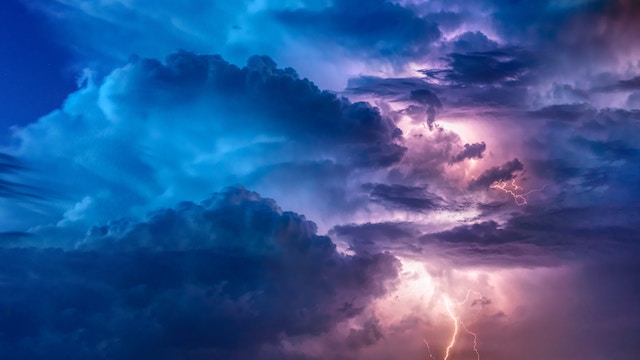
As I write this article, it’s raining. Through my window, I see the outline of trees dancing in the wind. The occasional car rolls by, momentarily illuminating the slick road before the world returns to darkness. I don’t think I’ll be going for a run today.
In my opinion, weather is one of the most interesting elements of fiction. A big storm or a sunny day can add symbolic meaning to one’s work. Furthermore, weather can underscore a feeling or mirror a dramatic conflict.
Weather is powerful, and today we’re going to examine a few ways to use it.
Weather as a Complicating Factor
Just like baseball games have rain-outs, stories have weather conditions that affect the outcome of events.
For an example from a classic, look no further than J.R.R. Tolkien’s The Fellowship of the Ring. As the Fellowship sets out on their journey to Mt. Doom, they decide to take a treacherous pass through the Misty Mountains.
A fine plan… if only the weather co-operated. Instead, they encounter a snowstorm, falling rocks, and eerie noises on the wind. These harsh conditions force them to turn back and reroute their path through the Mines of Moria. That’s where they run into the Balrog, and where (spoiler) Gandalf falls to his doom.
So, as we can see, weather can complicate a hero’s journey or even alter its course. It’s uniquely suited to do so because fighting weather is nearly impossible, even in a fantasy world like Tolkien’s. If you need a complicating factor, you’ll find few more effective.
Weather as Mood
Free story time! Well, at least a few sentences of a story. Let’s start off like this…
- Luna admired the twinkling sunlight peeking through the trees. The air surrounding her was mild and comforting, like floating in a warm bath.
If I’ve done my job right, you should feel relaxed. That’s the power of weather: in just two sentences, we can establish a distinct mood in our writing. Now, let’s examine the other end of the spectrum…
- Luna peered at the sparse moonlight creeping through the trees. The wind wailed mournfully and set her shivering in an instant.
All that’s changed here is the weather, yet the mood is totally different.
I don’t know about you, but I always feel better when it’s sunny outside. Likewise, readers will end up with a particular feeling based on the weather of your story.
If you want readers to feel happy, describe a sunny day. If you want them to feel apprehensive, describe a stormy evening. Speaking of which…
Weather as Symbolism
Ever notice how many descriptions of weather can double as those of humans? That’s because weather and human emotion often overlap. A few examples:
- Murph stormed into the store.
- “I want more ice cream,” the little girl thundered.
- His sunny optimism lit up the room.
Human emotion and weather are interconnected, even within the foundation of our language itself. As such, weather is an excellent tool for symbolizing emotion, and more.
William Shakespeare’s King Lear, for example, is one of the earliest examples of weather in fiction. When Lear wanders out into the wilds, a storm rolls in. The storm helps create a mood, yes. But it also goes deeper than that.
In this scene, Lear discusses his life with his Fool. He’s trying his best to understand the world around him and make sense of what’s happening with his kingdom and his daughters. Simultaneously, back in his castle things are going to hell.
Here, the chaos of the storm mirrors the chaos of the story. The weather symbolizes the wildness of the moment. It’s no coincidence that the storm dies down just as order is restored.
In your next book, consider underscoring a dramatic moment with symbolic weather. If the climax has an uncertain outcome, it will almost certainly be made more suspenseful by a storm. If your story has a happy ending, a sunny day can symbolize that fact nicely.
Or, if you want to leave your readers with a feeling of uncertainty, you might change your weather to overcast, with a chance of rain.

Weather as All of the Above
We’ve covered three ways to use weather in fiction. So why limit ourselves to just one per story? Why not use them all?
That’s what Neil Gaiman does in A Game of You, the fifth collected volume of his masterful Sandman comic book series. The story’s main character is a woman named Barbie (yes, like Barbie and Ken), who used to dream of being the princess of a fantasy realm when she was young.
When we meet her, however, she doesn’t dream at all. Barbie must descend back into her dreams to confront her own childhood (with the help of the titular Sandman, of course).
In the book’s final act, a hurricane descends upon New York City. The weather fulfills all three of our functions.
The hurricane is a complicating factor. Barbie’s friends are trying to buy her enough time to delve into her dreams and confront her past. However, when the hurricane threatens her safety, they must save her from the weather. One of Barbie’s friends, Wanda, even dies in the attempt.
The hurricane sets a clear mood: our story is in chaos and no one is safe. As the tension builds, the storm also builds in intensity, which heightens the emotions we’re already feeling.
The hurricane symbolizes Barbie’s inner turmoil. At its core, bad weather is an internal struggle. The earth provides us shelter, yet also destroys that shelter when natural disasters strike. The external weather symbolically mirrors the internal struggle of the main character. While the storm rages outside, Barbie battles her own past within her dreams. It’s symbolism like this that heightens an already exciting dramatic moment.
In Conclusion
Though we don’t always consider it, weather is one of the most powerful tools in the writer’s toolbox. This is just about the only opportunity we’ll ever have to control the weather. So I say we should use it!
You can use ProWritingAid to improve your weather descriptions to set the mood in your novel. Use our Sensory Report to highlight which of the five senses you've used in a scene, then mix it up! Add some sound and taste descriptions to your weather.
Struggling to describe the weather in a poignant way? Try out our Paraphrase button to rewrite your sentence.

